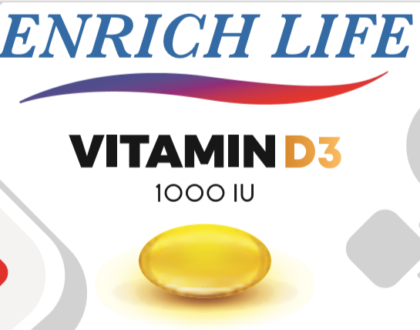BENEFITS OF VITAMIN D3

Vitamin D3 can have an impact on as many as 2,000 different genes within the body, and has a direct role on far more aspects of health than many might realize.
Vitamin D receptors are found in nearly every cell, and as soon as D binds to a receptor, it turns genes on or off, prompting changes at the cellular level. Studies completed over the last two decades have proven that this process turns off cancer-causing genes, turns on immunoprotective genes, and even tells cells which vitamins and minerals to absorb. This all has a great effect on many important body processes, including:
• Bone health
Strong bones are a result of good vitamin D3 intake because it helps regulate and control the body’s ability to absorb phosphorus and calcium—two compounds that provide density and strength to the skeletal system and teeth.
• Insulin control
Vitamin D3 stimulates the pancreas and triggers the process to make insulin. This is key for managing blood sugar levels more effectively and can help diabetics better control the disease.
• Lower blood pressure
A study from Boston University found that those with high blood pressure experienced a drop in numbers when vitamin D levels were increased. D3 actively reduces the concentration of renin, an enzyme secreted by the kidney that has an affect on blood vessels.
• Possible cancer prevention
Some evidence supports the idea that increased vitamin D3 can help slow the progression of prostate tumors, while other reports show promise that combining the nutrient with more fiber can reduce the risk of developing polyps that could lead to colon cancer.
Another helpful combo is vitamin D and calcium: A four-year trial found that when postmenopausal women supplemented with both, their likelihood of developing cancer dropped by 60 percent.
Vitamin D has also been frequently studied for its apparent relationship to breast cancer: In a study of 166 women undergoing treatment, nearly 70 percent had low levels of vitamin D, which have led many scientists to theorize that there could be a link.
• Hearth health
Heart function can also be impacted by the presence of vitamin D. In two studies, low levels of vitamin D were correlated to an increased likelihood of a heart attack. Though there isn’t a clear reason why, some researchers believe that vitamin D acts as a “heart tranquilizer,” improving cardiovascular endurance and keeping heart muscle cells from growing too large. This in turn prevents thickening of the walls of the ventricles, which can block blood flow and cause a heart attack.
• Mood
One of the most significant benefits to vitamin D3 though is its impact on mood. Many people suffer from seasonal affective disorder and generally feel happier when the sun is shining because of the synthesis of the vitamin that happens with direct exposure to UVB rays. Increasing levels of vitamin D is not only a pick-me-up but could effectively help to reduce the symptoms of clinical depression. Other treatments may be needed as well, but first ensuring proper absorption of the vitamin is critical.
Recommended Posts

GETTING MORE VITAMIN D3
September 30, 2019

Vitamin D3 ေသာက္ျခင္းျဖင့္ ရရွိလာမည့္အက်ိဳးေက်းဇူးမ်ား
September 30, 2019

